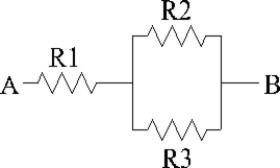Deck 8: Combination Circuits
Question
Question
Question
Question
Question
Question
Question
Question
Question
Question
Question
Question
Question
Question

Unlock Deck
Sign up to unlock the cards in this deck!
Unlock Deck
Unlock Deck
1/14
Play
Full screen (f)
Deck 8: Combination Circuits
1
A combination circuit is a circuit that contains .
A) only series components
B) only parallel components
C) both series and parallel components
D) both voltage and current sources
A) only series components
B) only parallel components
C) both series and parallel components
D) both voltage and current sources
C
2

Refer to the diagram above and solve using the values provided.
R1 = 50 Ω, R2 = 200 Ω, and R3 = 600 Ω, and 600 V is applied between A and B. What is the current flow through R3?
3 Α
3
A junction point of current paths is often called a .
A) circuit
B) combination
C) node
A) circuit
B) combination
C) node
C
4
In a series circuit, the is the sum of the individual resistances.

Unlock Deck
Unlock for access to all 14 flashcards in this deck.
Unlock Deck
k this deck
5
In a combination circuit, to identify series and parallel elements, you should .
A) trace the current path(s)
B) trace the voltage path(s)
C) calculate the total resistance
D) calculate the total current
A) trace the current path(s)
B) trace the voltage path(s)
C) calculate the total resistance
D) calculate the total current

Unlock Deck
Unlock for access to all 14 flashcards in this deck.
Unlock Deck
k this deck
6

Refer to the diagram above and solve using the values provided.
R1 = 240 Ω, R2 = 300 Ω, and R3 = 1200 Ω.What is the resistance between A and B?

Unlock Deck
Unlock for access to all 14 flashcards in this deck.
Unlock Deck
k this deck
7

Refer to the diagram above and solve using the values provided.
R1 = 15 Ω, R2 = 300 Ω, and R3 = 900 Ω, and 240 V is applied between A and B. What is the current flow through R1?

Unlock Deck
Unlock for access to all 14 flashcards in this deck.
Unlock Deck
k this deck
8
A series circuit has path(s) for current flow.
A) one
B) two
C) three
D) unlimited
A) one
B) two
C) three
D) unlimited

Unlock Deck
Unlock for access to all 14 flashcards in this deck.
Unlock Deck
k this deck
9

Refer to the diagram above and solve using the values provided.
R1 = 30 Ω, R2 = 600 Ω, and R3 = 1800 Ω,and 240 V is applied between A and B. What is the voltage across R2?

Unlock Deck
Unlock for access to all 14 flashcards in this deck.
Unlock Deck
k this deck
10

Refer to the diagram above and solve using the values provided.
R1 = 80 Ω, R2 = 100 Ω, and R3 = 400 Ω, and 480 V is applied between A and B. What is the total current flow?

Unlock Deck
Unlock for access to all 14 flashcards in this deck.
Unlock Deck
k this deck
11
Solving combination circuits includes a step in which you .
A) enlarge the circuit to several combination circuits
B) eliminate all parallel paths
C) expand the circuit to a more complex circuit
D) reduce the circuit to a simpler circuit
A) enlarge the circuit to several combination circuits
B) eliminate all parallel paths
C) expand the circuit to a more complex circuit
D) reduce the circuit to a simpler circuit

Unlock Deck
Unlock for access to all 14 flashcards in this deck.
Unlock Deck
k this deck
12
In parallel circuits, the voltage drop across any branch is the same as the .
A) applied voltage
B) current
C) resistance
A) applied voltage
B) current
C) resistance

Unlock Deck
Unlock for access to all 14 flashcards in this deck.
Unlock Deck
k this deck
13
The in a parallel circuit is equal to the sum of the currents through all of the circuit branches.

Unlock Deck
Unlock for access to all 14 flashcards in this deck.
Unlock Deck
k this deck
14
In series circuits, the is the same at any point in the circuit.
A) resistance
B) current
C) voltage drop
A) resistance
B) current
C) voltage drop

Unlock Deck
Unlock for access to all 14 flashcards in this deck.
Unlock Deck
k this deck


